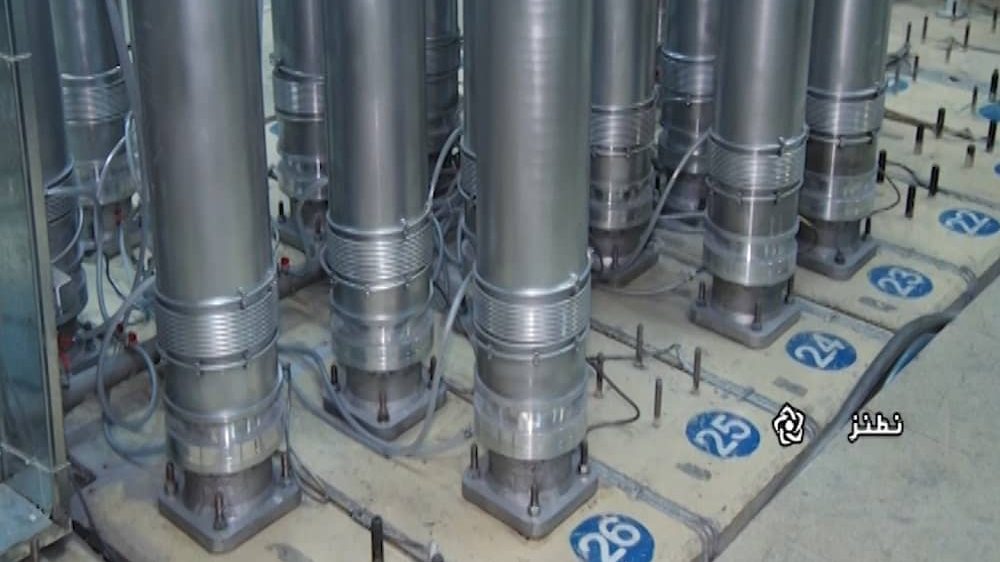Facebook
Twitter
LinkedIn
Pinterest
Reddit
Email
Print
 A cascade of centrifuges at the Natanz nuclear site in central Iran
A cascade of centrifuges at the Natanz nuclear site in central Iran
Three-minute read
Tehran’s latest maneuver to stall international pressure has only deepened its isolation. On September 10, 2025, European powers and the United States dismissed a newly announced “arrangement” between Rafael Grossi, Director General of the IAEA, and Iranian Foreign Minister Abbas Araghchi as nothing more than a time-buying tactic. At the same time, the agreement has triggered furious infighting within Iran’s political establishment, exposing deep cracks in the regime’s power structure.
Western Powers Reject “Time-Buying” Arrangement
In Vienna, Britain, France, and Germany warned that since June 13, 2025, Iran has “practically ended cooperation with the IAEA,” leaving its stockpile of enriched uranium unaccounted for more than two months. They stressed that Iran now holds 48 times the JCPOA limit of enriched uranium, including over 440 kilograms enriched to 60 percent — material for which there is “no credible civilian justification.”
The E3 rejected Tehran’s push for side deals, stressing that Iran “does not need a separate arrangement” and that any new steps “must be implemented within the framework of the NPT Comprehensive Safeguards Agreement.” They cautioned that if Tehran fails to restore full implementation before the next IAEA Board session, the Council must be prepared to hold Iran to account.
The European Union echoed that stance, stressing that Iran’s suspension of cooperation “cannot be justified under any circumstances” and urging Tehran to immediately resume full safeguards, provide updated verifiable declarations on its enriched uranium, and allow inspections at all nuclear facilities.
#Khamenei Spins Narratives to Boost Low Morale Amid #Iran’s Mounting Criseshttps://t.co/zEOHf5dAQf
— NCRI-FAC (@iran_policy) January 23, 2025
Washington went further, with Acting U.S. Envoy Howard Solomon warning that Iran has “ceased implementing its most basic and fundamental obligations under its safeguards agreement,” and that the Board should be “extremely concerned by this near-complete and prolonged loss of required information and access.”
With barely two weeks remaining before the snapback mechanism’s 30-day deadline, the regime’s room for maneuver is rapidly disappearing.
Araghchi’s Double Messaging
Initially, some regime officials hailed the Vienna announcement as a diplomatic victory. But sensing domestic backlash, Abbas Araghchi shifted tone when addressing state media inside Iran. In an interview with IRIB, he insisted that the IAEA had accepted Iran’s conditions: inspections must follow parliamentary law, access requests must be approved by the Supreme National Security Council, and bombed nuclear sites would remain off-limits until further notice.
Araghchi went further, claiming the agreement recognized Iran’s “security concerns” and warning that if snapback sanctions are imposed, “this deal will have no validity.” The Foreign Minister’s recalibration betrayed the regime’s fear of appearing weak in front of its own hardline factions and security apparatus, whose morale is critical for internal repression.
#Iran Faces Deepening Power Struggles Amid @UN Sanctions “Snapback” https://t.co/7CqMVhSUWz
— NCRI-FAC (@iran_policy) September 1, 2025
Parliamentarians Escalate Confrontation
The regime’s parliament amplified the rift. Ahmad Bakhshayesh Ardestani, a member of the National Security Committee, bluntly declared: “We should have built the bomb long ago. We’ve already paid the costs.” His admission torpedoed years of Tehran’s propaganda about a “peaceful” nuclear program.
Other MPs went on the offensive. Javad Hosseini-Kia threatened that Grossi should be arrested if he comes to Iran. MP Hamid Rasaee accused the government of “secrecy,” dismissing Grossi as a “spy.” Kayhan, the mouthpiece of the regime’s Supreme Leader Ali Khamenei, denounced the deal as another “deception” akin to the 2015 nuclear agreement, accusing negotiators of bypassing parliament.
In parallel, IRGC-linked figures like Amir Hayat-Moqaddam threatened that if Europe reimposes UN sanctions through snapback, Iran would quit the NPT altogether.
#Iran’s Power Structure Buckles Under Political, Economic, and Nuclear Pressurehttps://t.co/abvkCn5vAj
— NCRI-FAC (@iran_policy) September 9, 2025
Government Spin Meets Hardliner Fury
Caught between foreign rejection and internal revolt, the government tried to maintain balance. Masoud Pezeshkian’s spokesperson vaguely defended the deal while simultaneously raising the possibility of quitting the NPT — a dual tactic to project defiance abroad while appeasing radicals at home.
This cacophony reveals a regime that cannot sustain a coherent line. Abroad, it seeks to project moderation to delay sanctions. At home, it must play to an extremist base that demands escalation and views compromise as betrayal.
Factional Infighting Over “Nuclear Compromise” Exposes #Iranian Regime’s Deep Crisishttps://t.co/bYCijKZyGm
— NCRI-FAC (@iran_policy) August 25, 2025
A Regime Cornered
The contradiction is glaring. On one hand, Tehran seeks to deceive Western powers with “arrangements” that provide no transparency. On the other, officials inside Iran openly boast about the bomb, threaten to jail IAEA inspectors, and call Grossi an Israeli agent. The regime cannot reconcile these positions without undermining itself.
The warnings from MPs and IRGC affiliates underscore the leadership’s vulnerability: concessions abroad risk a collapse of support at home, especially among the very security forces tasked with defending the system.
Iran’s nuclear crisis has thus reached a new stage. International patience is running out, domestic factions are at each other’s throats, and the looming snapback threatens to choke off oil exports and financial lifelines. The Grossi-Araghchi “deal” was meant to buy time. Instead, it has exposed the regime’s paralysis — trapped between global isolation and an explosive society that increasingly sees its rulers’ defiance as empty rhetoric.
